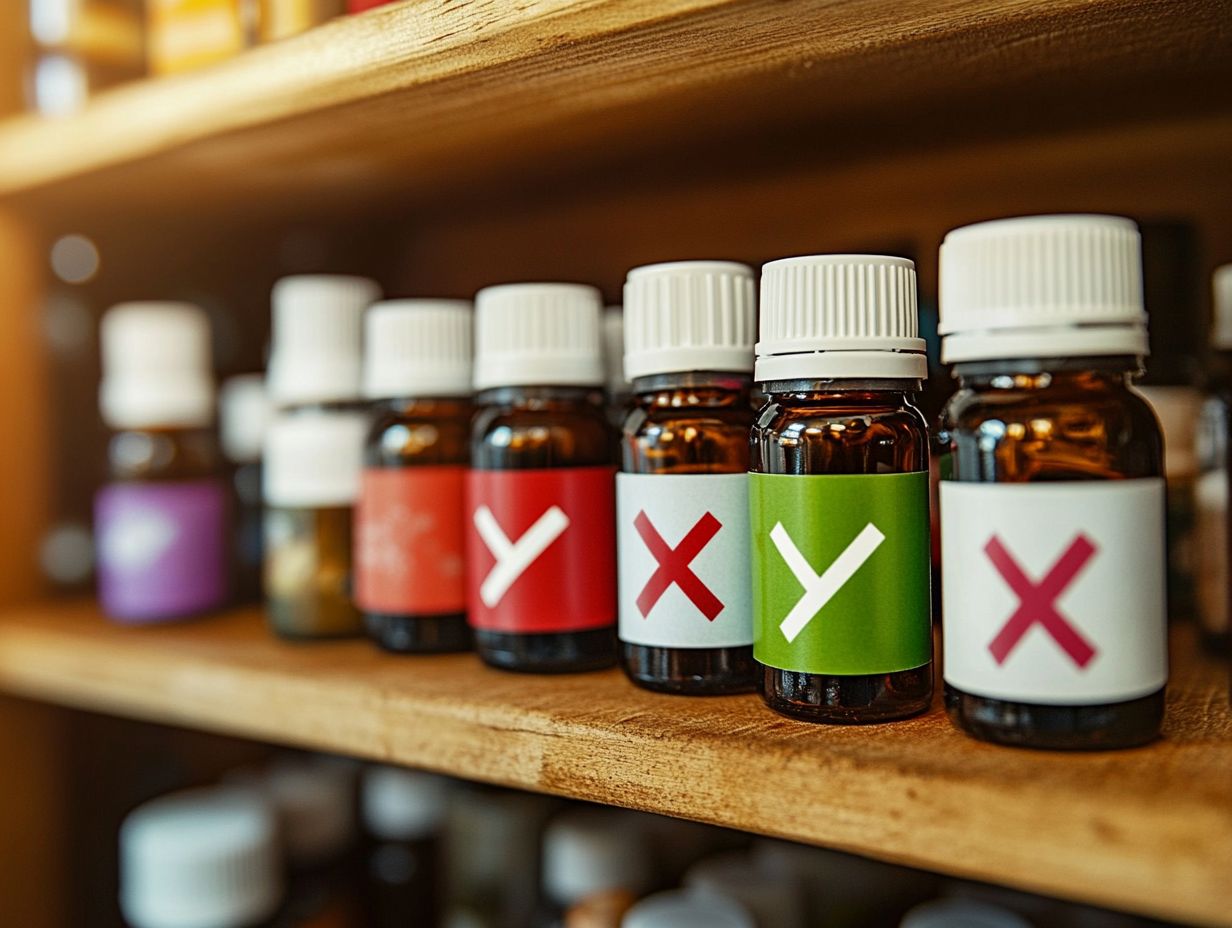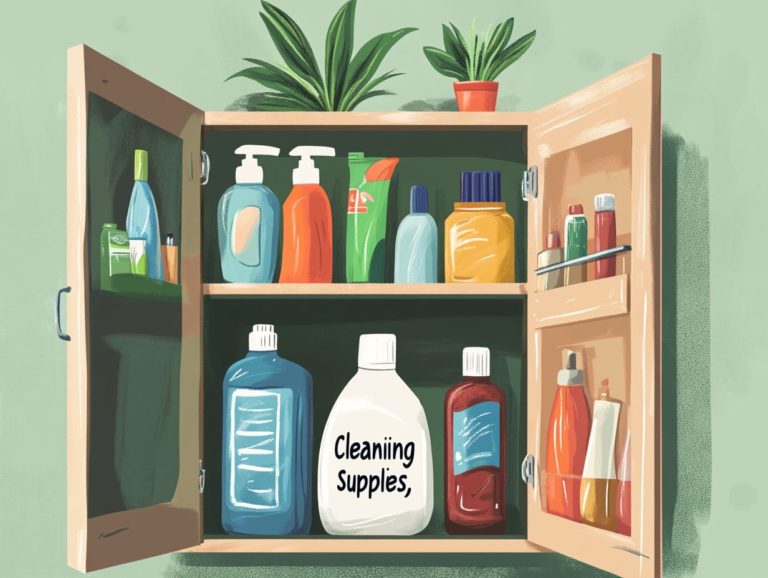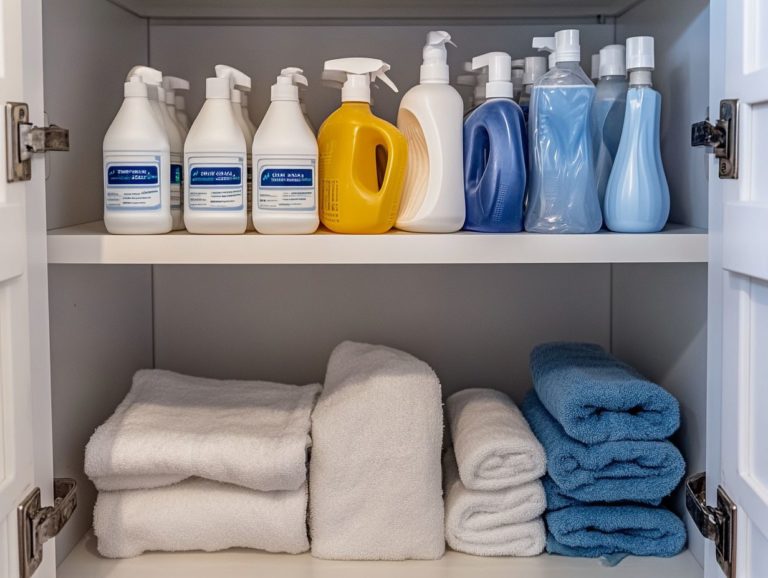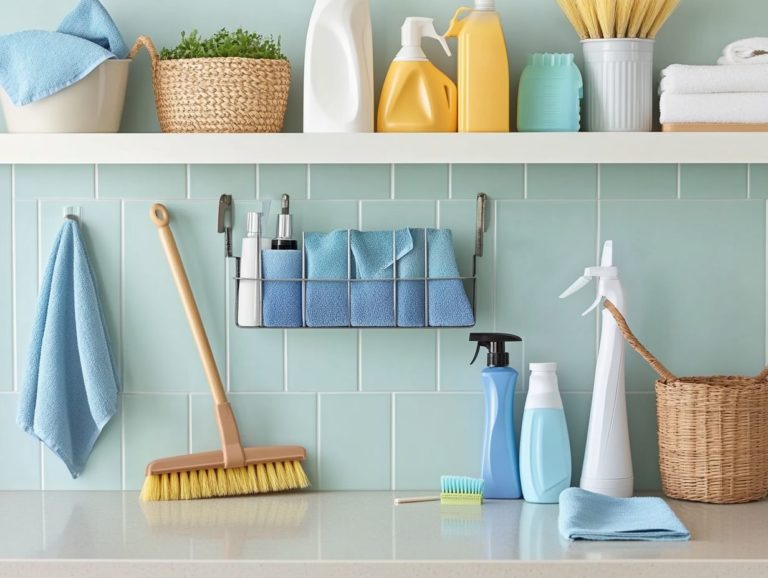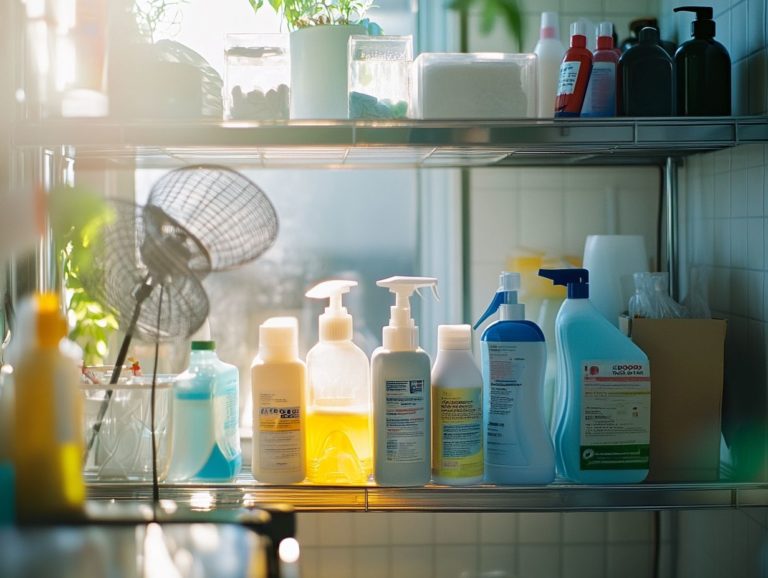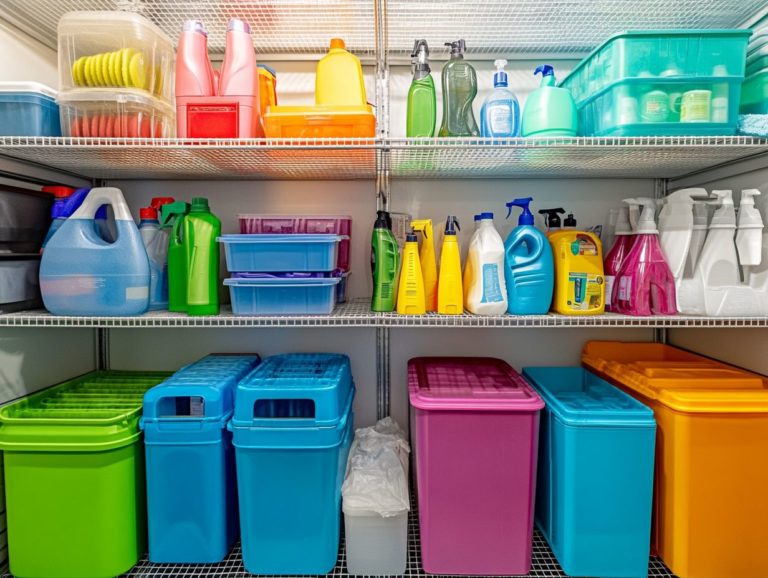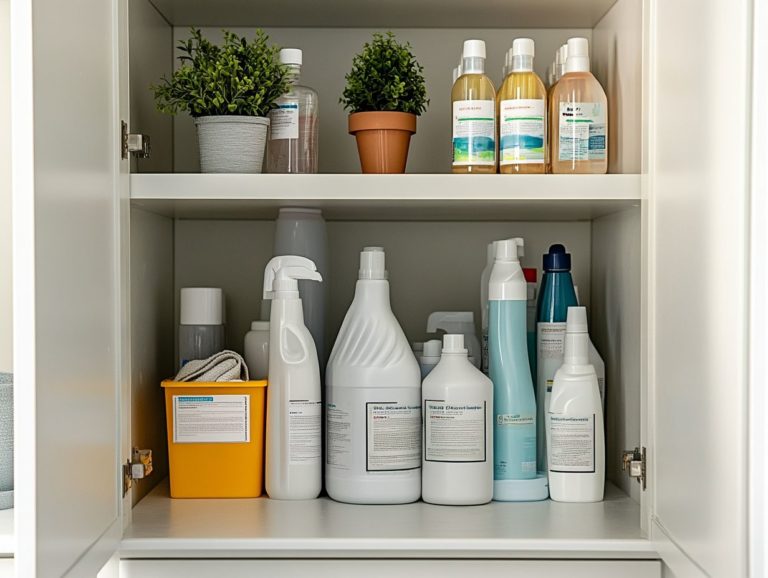Essential Oils: Storage Do’s and Don’ts
Proper storage of essential oils is paramount for preserving their potency and longevity. By employing the right techniques, you can ensure that these aromatic treasures maintain their effectiveness and remain safe for use. Essential oil safety should always be a priority to avoid potential issues.
Get ready to unlock the best practices for storing essential oils! In this article, you will discover the most suitable containers for storage, the ideal temperature conditions, and insights on how long you can keep your essential oils. We will also cover tips and guidelines for using essential oils every day, essential do’s and don’ts for maintaining their quality, and help you identify signs of spoilage. Additionally, we will discuss eco-friendly disposal methods for expired oils.
Contents
- Key Takeaways:
- How Are Essential Oils Stored?
- What Are The Do’s And Don’ts Of Storing Essential Oils?
- What Are The Signs Of Spoiled Essential Oils?
- How To Properly Dispose Of Expired Essential Oils?
- Frequently Asked Questions
- What are essential oils and why do they need proper storage?
- What is the recommended storage temperature for essential oils?
- Should essential oils be kept in the refrigerator?
- What type of containers are best for storing essential oils?
- Can essential oils be stored in plastic containers?
- How long can essential oils be stored before they expire?
Key Takeaways:
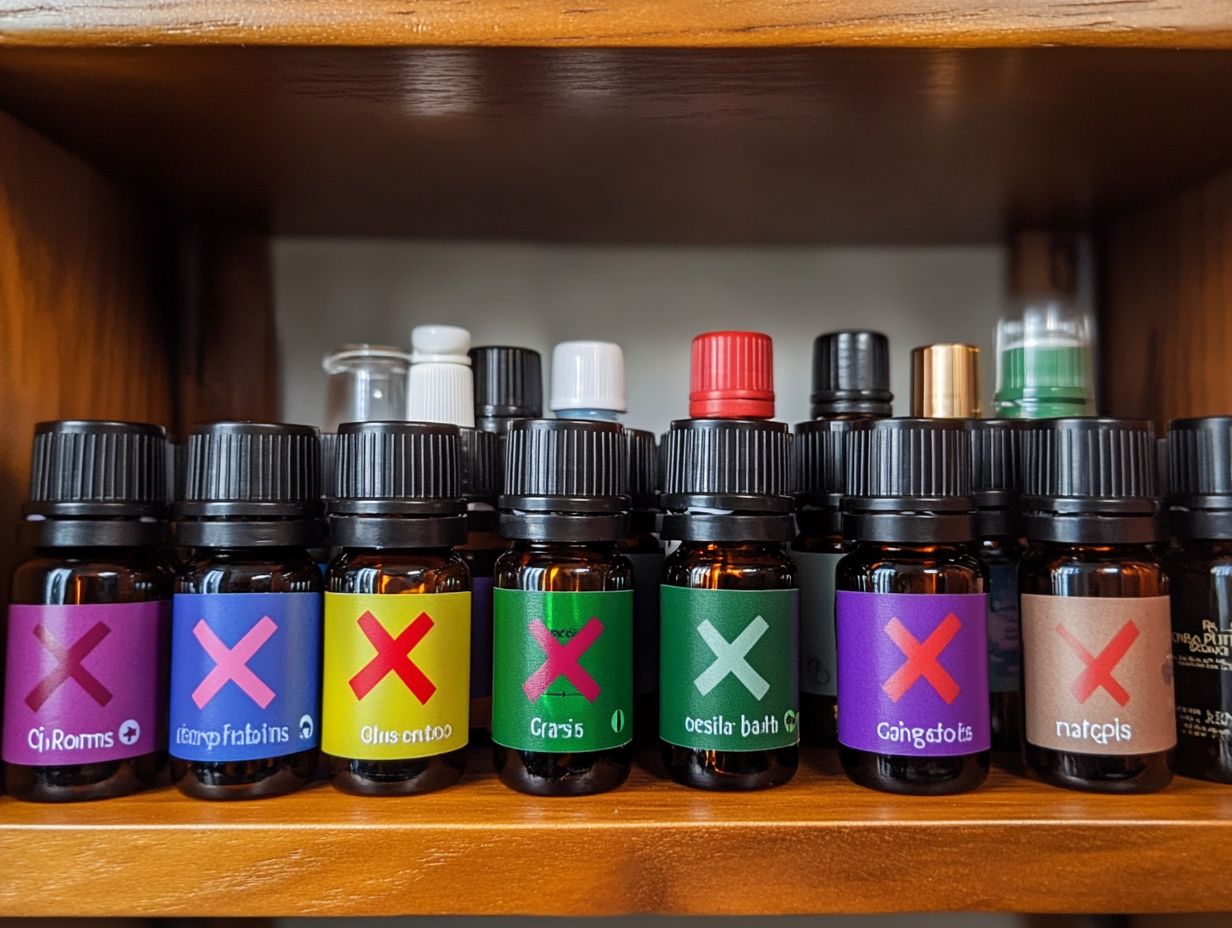
- Store essential oils in a cool, dark place to prolong shelf life and maintain quality.
- Use dark-colored glass bottles like amber or cobalt blue, and label them properly.
- Avoid direct sunlight and heat. Don’t use plastic bottles to keep your oils intact.
How Are Essential Oils Stored?
Properly storing essential oils is vital for preserving their quality and therapeutic benefits, as these oils are unstable substances that can easily deteriorate if not handled correctly. To ensure you get the most out of your oils, it s essential to use suitable containers, such as dark glass bottles, avoid exposure to heat, and keep them out of direct sunlight.
This article covers best practices for storing essential oils, from the ideal types of containers to the recommended storage environments. By paying attention to the integrity of your essential oils, you can fully enjoy the health benefits they offer when used appropriately, including understanding essential oil reactions and proper storage guidelines.
What Are The Best Containers For Essential Oils?
The finest containers for storing your essential oils are undoubtedly dark glass bottles, like amber or cobalt blue. These bottles effectively shield the oils from light exposure, ensuring that their quality and therapeutic properties are preserved over time.
Choosing dark glass minimizes the risk of chemical changes, which can compromise the delicate compounds within your precious oils. By blocking harmful UV rays and preventing degradation that often occurs with clear glass or plastic alternatives, these bottles guarantee that the potency of your oils remains intact. This is vital for maintaining essential oil quality and extending their shelf life.
For example, amber bottles are particularly well-suited for citrus oils, which are especially sensitive to light. On the other hand, cobalt blue bottles are a popular choice for oils like lavender, as they excel at absorbing and filtering specific wavelengths of light. Proper essential oil packaging is crucial for maintaining the therapeutic properties of your oils.
By utilizing these types of containers, you not only enhance the longevity of your oils but also preserve their aromatic characteristics, ultimately leading to better and more effective applications. This is beneficial for essential oil practices such as aromatherapy and homemade cleaning solutions.
What Is The Ideal Temperature For Storing Essential Oils?
The ideal temperature for storing your essential oils typically ranges from 60 to 70 degrees Fahrenheit. Extreme temperatures can diminish their potency and alter their chemical composition, affecting effectiveness.
High temperatures can change the oils’ makeup, affecting their smell and effectiveness. Conversely, low temperatures can cause the oils to thicken or even solidify, creating additional challenges when you want to use them.
To ensure the longevity and effectiveness of your essential oils, it s essential to store them in a cool, stable environment, away from direct sunlight and humidity. Ideally, keeping them in dark glass bottles tucked away in a cupboard, drawer, or on an essential oil shelf will help maintain the desired temperature while shielding them from light exposure.
How Long Can Essential Oils Be Stored?
The shelf life of essential oils can vary quite a bit depending on the type, but you ll find that most pure essential oils can be stored for about 1 to 3 years under optimal conditions. This helps you enjoy their health benefits over an extended period. For instance, essential oils like peppermint and eucalyptus have longer shelf lives compared to others.
To preserve their longevity, be mindful of factors like exposure to light, heat, and air, as they can drastically diminish the efficacy of your oils. Store your essential oils in dark glass bottles, away from direct sunlight, and in a cool environment to maintain their integrity.
It s essential to recognize signs of deterioration, such as changes in color, odor, or consistency. The community of essential oil users often stresses that by sealing containers tightly after each use and using the oils within a reasonable timeframe, you can dramatically extend their shelf life, ensuring they remain effective and safe for whichever aromatic or therapeutic applications you have in mind. Keeping an essential oil display pack can help organize and track your oils.
What Are The Do’s And Don’ts Of Storing Essential Oils?
Regarding storing essential oils, grasping the do’s and don’ts is crucial for ensuring their safety and maintaining their integrity.
You should always store the oils in dark glass containers, keeping them away from light and heat sources. Neglecting these practices can expose your essential oils to harmful conditions that compromise their quality.
By adhering to certain best practices, you can significantly enhance their longevity and efficacy, allowing you to fully reap the numerous health benefits these remarkable natural oils offer.
Do’s:
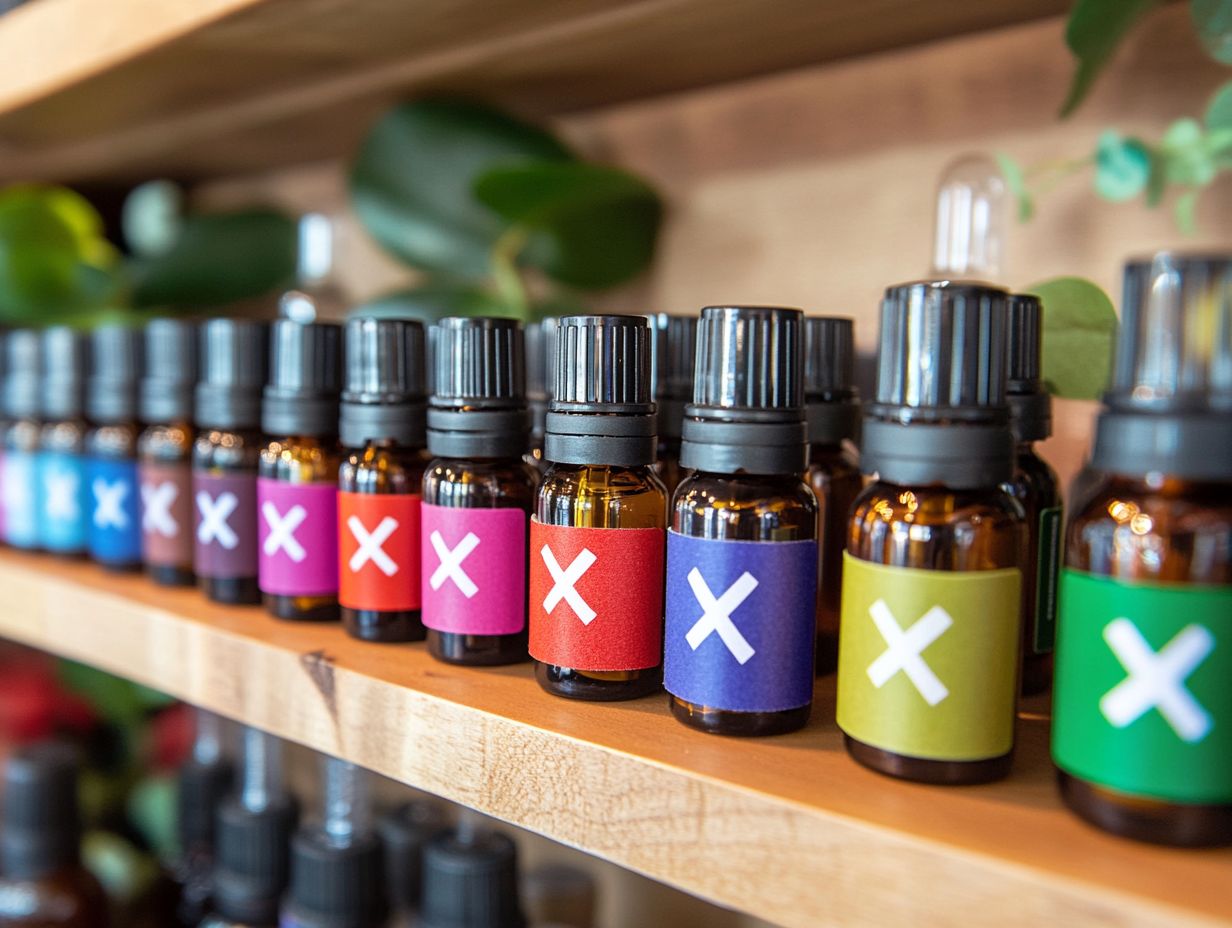
For instance, by keeping your essential oils in dark glass bottles, you protect them from harmful UV light that can lead to degradation over time. Using rubber droppers is another wise practice for dispensing these oils; this minimizes their exposure to air and prevents contamination from using other materials. Proper essential oil packaging and dispensing methods are vital for maintaining essential oil integrity.
It s equally important to ensure that the lids of the bottles are tightly sealed after each use. This simple step preserves the oils’ aromatic compounds and potency. By implementing these straightforward measures, you create an ideal environment for your essential oils, enabling you to maximize their health benefits.
1. Store In A Cool, Dark Place
Storing your essential oils in a cool, dark place is crucial to protect them from direct sunlight, which can hasten the breakdown process and diminish their potency. Avoid direct sunlight to maintain essential oil health.
Stable temperatures are also important, as fluctuations can degrade the quality of these precious oils over time. A temperature range of 60 F to 75 F (15 C to 24 C) is generally ideal for their storage. Understanding essential oil temperature requirements is key to preserving their health benefits.
To create the perfect environment, consider using cabinets or drawers that not only shield the oils from sunlight but also help regulate temperature by insulating them from external heat sources. It s wise to keep them away from humidity and avoid direct contact with other strongly scented products, as this can alter their unique fragrance profiles. Using a carrying case for your essential oils can also help protect them during travel.
Regularly checking the conditions in which you store them will ensure they remain as effective as possible. By following these tips, you ll keep your essential oils effective and ready for use whenever you need them!
2. Keep The Bottles Tightly Closed
Sealing your essential oil bottles tightly after each use is crucial! This practice helps maintain their integrity and prevents evaporation and contamination.
When essential oils are exposed to air, they can spoil and lose their therapeutic properties. Proper sealing keeps harmful elements out and ensures that the rich aromas and beneficial compounds remain intact.
Using suitable containers, like dark glass bottles, adds an extra layer of protection against light and environmental factors that could degrade the oils. By prioritizing sealing and storage, you can act now to protect your essential oils from degradation!
3. Label The Bottles Properly
Properly labeling your essential oil bottles is essential! This practice aids in identifying the oils and helps you track their usage over time.
Include details like the type of oil, purchase date, and suggested uses to manage your collection effectively. This avoids using expired or compromised oils.
- Type of oil
- Purchase date
- Suggested uses
Proper labeling is vital for preserving the potency and integrity of your essential oils. Factors like light, heat, and air can degrade quality, so good labeling helps you keep track of expiration dates.
With clear labels, you can easily recognize when an oil needs replacing or if it s still at its peak efficacy. This ensures safer, more effective applications in aromatherapy and other uses, enhancing your experience with these natural remedies.
4. Use Dark-Colored Glass Bottles
Choosing dark-colored glass bottles for storing your essential oils is a smart choice! They protect against UV light, preventing the oils from degrading and ensuring that their therapeutic properties remain intact.
By reducing light exposure, these containers help avoid light-related oxidation, which can compromise your oils’ quality. Unlike clear or lighter-colored bottles, dark glass acts as a strong barrier, preserving the integrity of your essential oils for longer.
This means you can enjoy the benefits of your essential oils whether for therapeutic, aromatic, or cosmetic purposes without worrying about diminished quality over time.
Don’ts:
To protect the quality and safety of your essential oils, avoid storage pitfalls that could lead to undesirable effects and reactions.
Many enthusiasts overlook the significance of proper storage, choosing inappropriate containers or leaving their oils in spots exposed to light and heat. Such negligence can degrade essential oil compounds, altering their fragrance and effectiveness.
Improper sealing can lead to contamination, resulting in spoiled or less effective oils. Ensure longevity and maintain efficacy by using dark glass bottles and keeping them in a cool, dark place, away from moisture.
By following these guidelines, you can ensure that your essential oils remain potent and safe for use, allowing you to fully enjoy their benefits.
1. Expose To Direct Sunlight Or Heat
Exposing essential oils to direct sunlight or heat can lead to significant deterioration, diminishing their potency and health benefits, ultimately compromising their integrity.
Store essential oils in a cool, dark environment. For example, keeping essential oils in a bathroom where humidity and temperature fluctuate, or in a garage that might experience extreme temperatures, is not advisable. Instead, consider utilizing a dedicated cabinet or a shelf in a climate-controlled room for optimal storage. Additionally, it’s important to learn how to store essential oils safely to ensure their longevity and effectiveness.
By shielding these oils from heat sources such as stoves, radiators, or direct sunlight streaming through windows you can preserve their quality and enhance their effectiveness for aromatherapy or medicinal use.
2. Store Near Heat Sources
Storing essential oils near heat sources, like stoves or radiators, can quickly reduce the oils potency. This exposure can also alter their chemical composition, making them less effective.
To preserve the therapeutic benefits and rich aromas of your essential oils, choose a storage location that is cool, dark, and dry. Place them in a dedicated cabinet away from heat-producing appliances to ensure a stable environment.
Taking these steps helps maintain the integrity of your oils, allowing you to enjoy their full range of benefits for longer.
3. Store In Plastic Or Clear Bottles
Storing essential oils in plastic or clear bottles is a choice best avoided. These materials can interact with the oils, leading to contamination and compromising their quality.
The quickly changing nature of essential oils can gradually break down plastic, releasing harmful chemicals that could taint the oil and potentially pose health risks. Using improper packaging diminishes the effectiveness of these precious oils and may trigger unforeseen reactions when applied to your skin or diffused in your space.
By opting for high-quality packaging, such as dark glass bottles, you can preserve the integrity, potency, and safety of your essential oils. This way, you ensure that you re reaping all the benefits without the risks associated with inferior materials.
What Are The Signs Of Spoiled Essential Oils?
Recognizing the signs of spoiled essential oils is essential for safeguarding both their safety and effectiveness. Using compromised oils can result in adverse reactions or skin irritation, so be vigilant in identifying any indicators of spoilage.
By paying close attention to the quality of your essential oils, you can ensure a safe and enjoyable experience in your aromatic endeavors.
1. Change In Color Or Consistency
A noticeable change in color or consistency is often one of the first signs that your essential oils might have spoiled, indicating potential degradation and a decline in quality.
Routinely examine your oils, as these visual cues can reveal a great deal about the oil’s health and safety for use. If you notice that an essential oil has shifted to a darker hue, it might signal improper storage conditions or oxidation. An oil that has thickened could be undergoing some chemical changes.
By staying vigilant and noting any variations in appearance, you can ensure that your essential oils remain effective and safe for their intended applications. Regular assessments are key to maintaining the integrity of your oils and ensuring they deliver the health benefits for which they are so highly valued.
2. Unpleasant Smell
An unpleasant smell wafting from your essential oils can be a telltale sign that they’ve gone bad, indicating chemical changes that could lead to unwelcome reactions when you use them.
When assessing the quality of essential oils, trust your sense of smell; it s your best ally. High-quality oils should exude vibrant, rich scents that transport you to their natural origins. If you detect an aroma that seems off, sour, or rancid, consider it a strong warning of spoilage.
Using oils that smell unappealing not only risks skin irritations or allergic reactions, but also undermines the therapeutic benefits you seek.
By understanding how to recognize these warning signs, you empower yourself to make informed choices, significantly enhancing both your safety and your overall experience with essential oils.
3. Skin Irritation
Experiencing skin irritation after using essential oils should raise a red flag. This signals the possibility of spoilage or improper dilution.
This underscores the critical need for you to assess the quality and safety of the oils before applying them.
When oils have passed their prime, they not only lose their therapeutic benefits but can also pose risks, such as unwanted skin reactions. Don’t forget that essential oils are powerful! Always dilute them with a carrier oil, which is a neutral oil used to dilute essential oils to make them safer for skin application, to minimize potential adverse effects.
Make sure that anyone handling these oils is well-versed in safe usage practices, including an awareness of individual skin sensitivities.
By taking these important precautions, you can fully embrace the numerous benefits of essential oils while avoiding unnecessary discomfort, ensuring both safety and efficacy throughout your aromatic journey.
How To Properly Dispose Of Expired Essential Oils?
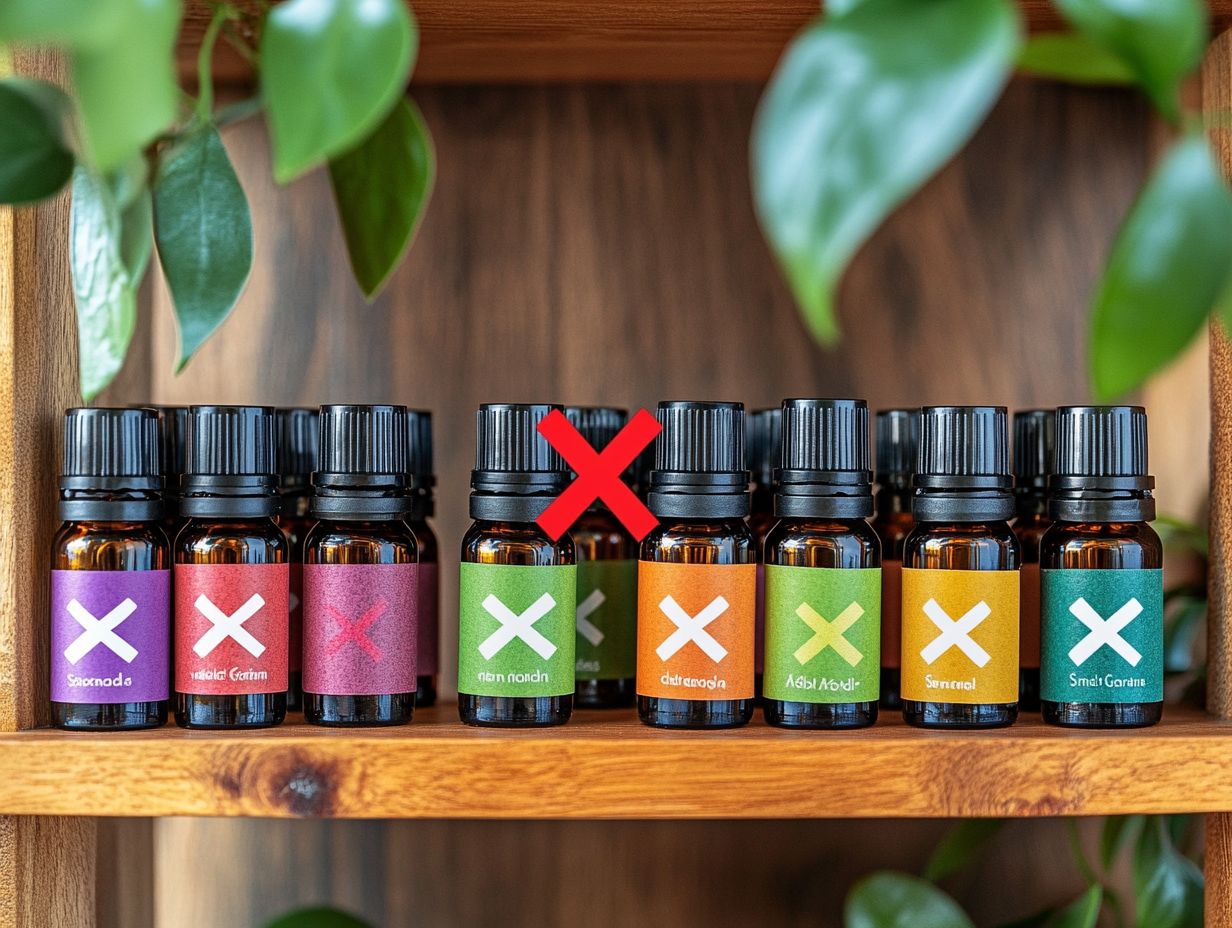
Proper disposal of expired essential oils is essential for both environmental safety and personal health. When these oils are not disposed of correctly, they can lead to contamination and potentially cause adverse reactions in cleaning products or other applications.
Taking the time to handle their disposal responsibly not only protects your well-being but also contributes to a healthier planet.
1. Dilute And Use As Cleaning Products
Diluting expired essential oils and incorporating them into your homemade cleaning products is an excellent way to repurpose those oils while prioritizing safety and minimizing waste.
By doing so, you can harness their natural antibacterial and antifungal properties, crafting an eco-friendly alternative to commercial cleaning solutions that are often brimming with harsh chemicals. Using diluted essential oils also helps to reduce the risk of skin irritation or respiratory issues, particularly for those with sensitivities.
For the best results, aim for a dilution ratio of about 1-2 drops of essential oil per tablespoon of carrier liquid; this way, you keep the scents delightful without letting them overpower the room.
Always perform a skin test on surfaces before applying your concoction fully; this means testing the oil on a small skin area first to check for reactions. Don t forget to store any unused blends in a cool, dark place to preserve their potency.
2. Use In A Diffuser
Expired essential oils can occasionally still find a place in your diffuser, allowing you to savor their aromatic essence and possibly enjoy some therapeutic benefits though a bit of caution is advisable.
Before you plunge in, it s essential to assess the quality of these oils. Begin by examining them for any changes in consistency, color, or clarity; these traits can signal degradation. Next, take a moment to inhale the oil. If the scent strikes you as off or unpleasant, it’s prudent to steer clear of using it in your diffuser.
While some expired oils might still grace you with a delightful aroma and their calming effects, others could lead to undesirable consequences. Exercising due diligence in essential oil usage is vital to ensuring a safe and enjoyable experience.
3. Mix With Carrier Oil For A Massage Blend
Mixing expired essential oils with carrier oils can result in a distinctive massage blend, allowing you to savor the aromatic and therapeutic properties of the oils while prioritizing your safety. This practice also offers numerous health benefits.
However, you must exercise caution, as the quality of essential oils plays a pivotal role in the effectiveness and safety of your blend. It’s essential to differentiate between oils that have merely lost their potency and those that may have developed harmful compounds over time due to improper storage or exposure to the oxidation process.
Before diving into the blending process, take a moment to inspect the expired oils for any shifts in color, scent, or consistency; these changes could signal degradation. Once you’ve determined that the oils are suitable for use, combining them with a carrier oil like sweet almond or jojoba can enhance your overall experience while diluting any potential irritants.
Choosing pure essential oils and mixing them properly leads to better results and enhances the therapeutic properties of the blend. This thoughtful approach not only amplifies the benefits but also delights your senses during the massage.
Remember, essential oil safety is paramount to avoid any adverse reactions.
4. Recycle The Bottles
Recycling essential oil bottles is a smart, eco-friendly practice that reduces waste and opens up a world of possibilities for repurposing those containers, championing sustainability. Clean and reuse those bottles to unlock their full potential while maintaining the integrity of essential oils for future use.
By embracing this habit, you can make a meaningful contribution to the environment while unleashing your creativity on these little bottles. Imagine transforming empty bottles into chic home decor, delightful tiny planters for your herbs, or even custom gift packaging that will impress your friends. You could also consider using these bottles for homemade cleaning products or as part of an essential oil display pack.
However, it’s crucial to approach the recycling process with care. Be sure to clean the bottles thoroughly to eliminate any residue before you dispose of or repurpose them. This enhances the success of your recycling efforts and prevents contamination of recycled materials, leading to a healthier planet and a more resourceful lifestyle. Proper storage and safe handling of these containers can extend their usability.
Frequently Asked Questions
-
What are essential oils and why do they need proper storage?
Essential oils are highly concentrated plant extracts known for their therapeutic and aromatic properties. They need proper storage to maintain their potency and prevent spoilage. Always keep oils in dark glass bottles and avoid direct sunlight to ensure they retain their effectiveness.
-
What is the recommended storage temperature for essential oils?
The ideal storage temperature for essential oils is between 60-85 degrees Fahrenheit. Exposure to extreme temperatures can cause the oils to lose quality and effectiveness. Avoid heat and store essential oils in a cool, dark place to extend their shelf life.
-
Should essential oils be kept in the refrigerator?
No, essential oils should not be stored in the refrigerator. The fluctuating temperatures and moisture in the fridge can cause the oils to spoil or become cloudy. Instead, proper storage in a dedicated essential oil shelf is recommended to maintain essential oil quality.
-
What type of containers are best for storing essential oils?
Dark glass bottles, such as amber or cobalt blue, are the best containers for storing essential oils. They provide protection from light, helping to extend the oils’ shelf life. Using a rubber dropper minimizes exposure to air, further preserving the oils.
-
Can essential oils be stored in plastic containers?
No, plastic containers are not suitable for storing essential oils. The oils can interact with the plastic, causing it to deteriorate and contaminating the oils in the process. Stick to dark glass bottles to maintain the integrity of essential oils and avoid their deterioration.
-
How long can essential oils be stored before they expire?
The shelf life of essential oils varies, but on average, they can be stored for 1-3 years. However, some oils, like citrus oils, have a shorter lifespan and should be used within 6-12 months. Regularly check for reactions or changes in the oils’ properties to ensure they are still suitable for use.
Start your recycling journey today and make a difference!
With the right care, your essential oils can last and serve you well!

